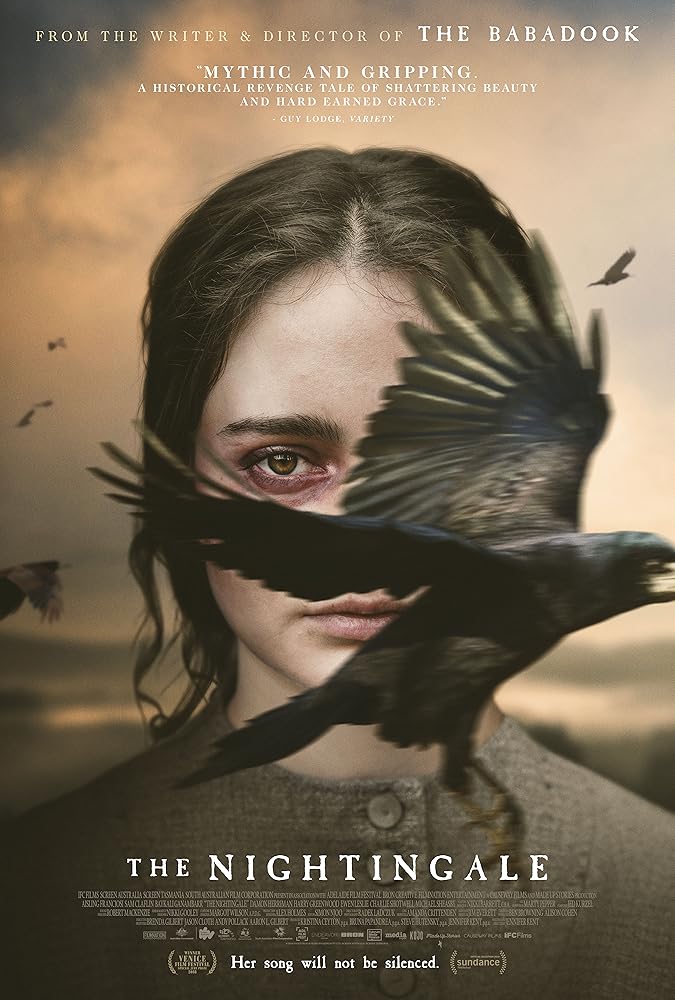
Okay, maybe that title should
come with a bit of a caveat. While I maintain that The Nightingale,
Australian director Jennifer Kent’s masterful and emotionally dismantling
follow-up to the equally masterful and emotionally dismantling The Babadook,
is hands down the best movie I’ve seen this year, it’s not something everyone will
be able to make it through. It’s a brutal examination of cruelty, violence, colonialism,
toxic masculinity and revenge among other things that pulls no punches and
takes no prisoners. To give you an idea of how unflinching this movie is, there
are three rape scenes, two of which are within the first twenty minutes. But
instead of cheap thrills and shock value, it all serves to drive a greater
point home without plunging headfirst into hopelessness and misanthropy.
Set in 1825, our story follows
Clare (Aisling Franciosi), an Irish convict doing time in an outpost in
Tasmania, but has been held for months after her seven-year sentence expired by
her cruel warden, Lieutenant Hawkins (Sam Claflin). When her husband (Michael
Sheasby) confronts him about it, the lieutenant bursts into their home in the
middle of the night, kills the husband and their baby, and has his soldiers rape
Clare. By morning he has left to transfer to a new post, so Clare sets off to
hunt him down and exact her revenge, hiring an Aboriginal tracker named Billy
(Baylik Ganambarr) to help her navigate the unforgiving wilderness.
I was prepared for a tough sit.
I was prepared to feel emotionally exhausted by the end. But all the mental
preparation in the world couldn’t prepare me for the absolute mental and emotional
walloping this movie delivers. And what makes it bruise so hard is that all of
the harrowing cruelty and unspeakable atrocities are all happening against
the backdrop of real-world harrowing cruelty and unspeakable atrocities.
America may have its own shameful history of colonialism and genocide, but
Australia gives us a run for their money, having started as a penal colony
where murderers, rapists and thieves were being overseen by the riff raff of
the British Army and driving the Aboriginals to the brink of extinction, and in
the case of the Tasmanians, wiping them out entirely. The sheer brutality of
these scenes can be a little hard to bear. The scene where Clare is gang raped
and her family in murdered was one of the few times a movie ever made me cover
my eyes. The echoes of this trauma ring throughout its grueling two hours and
fifteen minutes, whether it’s through Clare’s recurring nightmares, or when she
and Billy are drudging through the wet, rugged forests, where the black birds
caw like screaming babies.
It’s this potent concoction of
rage, sorrow and bloodlust that fuels Clare and Billy’s journey, even if their
alliance is an uneasy one. Clare at first treats Billy with the same amount of animosity,
distrust and prejudice as every other white person on the island, while Billy,
the sole survivor of his tribe, is thoroughly done with the white man’s shit,
and the only reason he hasn’t left Clare to die alone is because he knows he
won’t get paid if he does. In the hands of a lesser director, this plot point
probably would’ve pulled a Green
Book and had these characters overcome their differences and become
friends by the end. Kent understands it’s not that simple and it’s not what
this movie is about. Their hostility towards each other does slowly but surely dissolve
into trust, but that trust is undeniably built on their mutual contempt for
their oppressors. In fact, their first moment of bonding is when they sit
around the fire and curse the white man in their respective native languages.
The plot occasionally pivots
back to Hawkins and his men struggling to make it through the harsh wilderness,
forcing Billy’s Uncle Charlie (who’s not Billy’s real uncle, but is the closest
thing he has to family left) guide them at gunpoint, and having a small band of
prisoners haul whatever they pillage along the way. Although they’re all
unquestionably irredeemable monsters, the circumstances that drive them are
still recognizably human. One soldier is racked with guilt over what he’s done,
another is simply keeping his head down and following orders, even Hawkins, cruel
and heartless as he may be, acts out of frustration and dissatisfaction with
his position. It doesn’t excuse the vicious cycle of abuse they inflict on each
other and everyone else around them, especially a highly disturbing sequence
where Hawkins tries to teach a young boy (Charlie Shotwell) his twisted ways of
the world, but it certainly explains it.
The Nightingale has
quite a bit in common with The Babadook, and even a little with my favorite
film of last year, Hereditary:
all three are tumultuous dissections of the volatile effects of unprocessed
grief channeled by volcanic performances by women that were unfairly ignored by
the Academy. (As tremendous as Aisling Franciosi’s performance was, I highly
doubt she’ll get the recognition she deserves come award season.) There are
even traces of Unforgiven (and other revisionist Westerns it inspired),
where the main character’s hunt for justice leaves them with even less than
what they started with, and the psychological toll of taking lives becomes more
and more taxing the closer they get to their target. It’s a lot to take in, and
it’s not something everyone can endure. There have been reports of people
leaving the theater when this was making the festival circuit, and it’s certainly
justifiable in some cases, especially those first 20 minutes. But for those who
can grit their teeth and make it through, they will come out the other end
forged in fire.
10/10
No comments:
Post a Comment